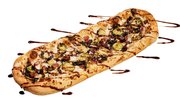News
Starbucks Canada to the 'food waste' rescue!
February 8, 2019
Starbucks Canada is on a mission to rescue 100 percent of food available for donation from its more than 1,100 company-owned stores. To see that through, the company has launched Starbucks FoodShare, a national effort to provide ready-to-eat meals to people in need, according to a company press release.
Building on a successful pilot with Second Harvest, the largest food rescue organization in Canada, the program is launching Feb. 22 in Ontario starting with more than 250 stores in the greater Toronto area. It hopes to expand the program to even more cities and provinces, with a goal to have a national solution in place by 2021.
"Wasted food is a wide-scale problem for everyone in the food business, while more than 4 million Canadians are impacted by hunger," Luisa Girotto, vice president of public affairs, Starbucks Canada, said in the release. "This is unacceptable, and we will help solve this now that we have a way to safely donate chilled, perishable food while preserving its quality."
A focus on food recovery
In Canada, the company has always donated unsold pastries and baked goods but wanted to do more. It invested in research and quality assurance testing to develop a program to safely donate chilled and perishable food to those in need. Now, nourishing items like breakfast sandwiches, paninis, protein boxes, salads, yogurt, milk and dairy alternatives like soy and coconut, can be safely donated and enjoyed by those in need, according to the release.
Starbucks FoodShare has identified guidelines and developed training on maintaining the temperature, texture and flavor of this food so when it reaches a person in need, they can safely enjoy it. In turn, Second Harvest will work with local community groups across the province who will collect the food to ensure these food safety standards are met.
"We're thrilled to partner with Starbucks to support food recovery in local neighborhoods to ensure people have the food they need to be healthy while also making a positive impact on the environment," said Lori Nikkel, CEO of Second Harvest. "We all have a part to play in reducing the social and environmental costs of food waste and it's great to see Starbucks taking a leadership role."
A positive impact on the environment
In addition to combating hunger, the Starbucks FoodShare program will divert food surplus from landfills, helping to minimize the company's environmental footprint. In Canada, nearly 60 percent of all food produced is lost and wasted annually, according to a recent study titled The Avoidable Crisis Of Food Waste.
As of press time, Starbucks did not return FastCasual's request for comment regarding if the U.S. has a similar practice in place.
 ChatGPT
ChatGPT Grok
Grok Perplexity
Perplexity Claude
Claude












